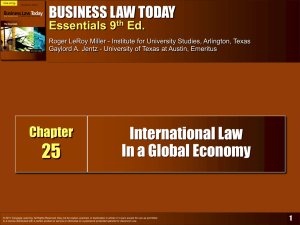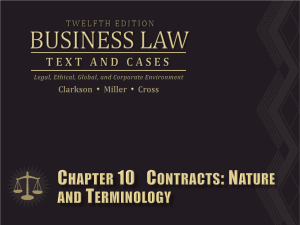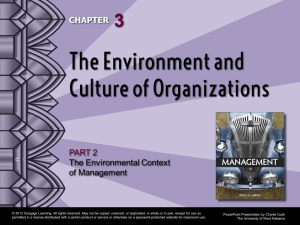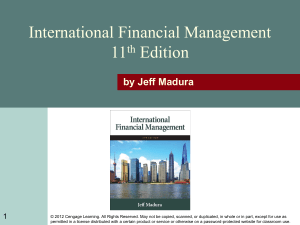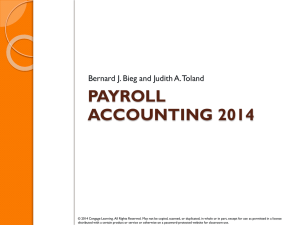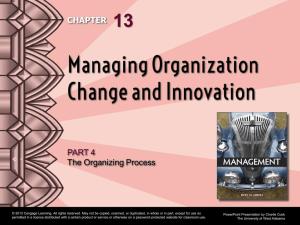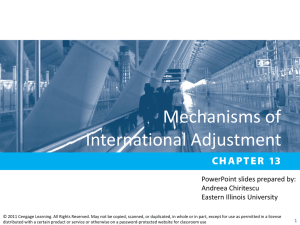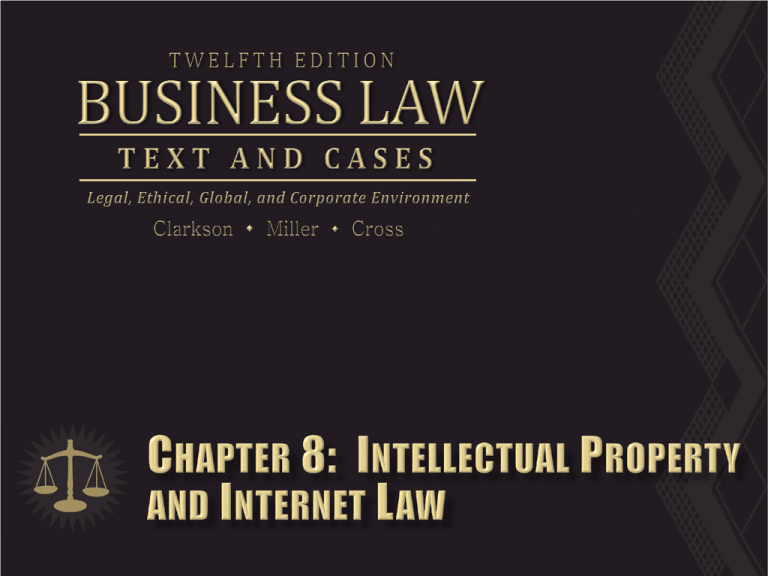
Intellectual property (or “I.P.”) is
becoming more important because
of the significant value of I.P. to
many corporations, which in some
cases may exceed the value of
physical, tangible assets.
2
© 2012 Cengage Learning. All Rights Reserved. May not be copied, scanned, or duplicated, in whole or in part, except for use as permitted in a
license distributed with a certain product or service or otherwise on a password-protected website for classroom use.
Founders of America understood
the value of I.P.: Article I § 8
authorizes Congress to “secur[e] for
limited times to Authors and
Inventors the exclusive Right to
their respective Writings and
Discoveries.”
3
© 2012 Cengage Learning. All Rights Reserved. May not be copied, scanned, or duplicated, in whole or in part, except for use as permitted in a
license distributed with a certain product or service or otherwise on a password-protected website for classroom use.
Distinctive mark, motto or device or
emblem that a manufacturer
stamps, prints or otherwise affixes
to the goods it produces.
Distinguish product/service from
goods of other manufacturers and
merchants.
4
© 2012 Cengage Learning. All Rights Reserved. May not be copied, scanned, or duplicated, in whole or in part, except for use as permitted in a
license distributed with a certain product or service or otherwise on a password-protected website for classroom use.
Trademarks helps avoid consumer
confusion.
CASE 8.1
The Coca Cola Co. v. The Koke
Co. of America (1920). Defendants
argued that Coca-Cola was not entitled
to trademark protection. Why?
5
© 2012 Cengage Learning. All Rights Reserved. May not be copied, scanned, or duplicated, in whole or in part, except for use as permitted in a
license distributed with a certain product or service or otherwise on a password-protected website for classroom use.
Lanham Trademark Act (1946)
creates incentives for companies to
invest; prevents unjust enrichment
of companies who infringe.
6
© 2012 Cengage Learning. All Rights Reserved. May not be copied, scanned, or duplicated, in whole or in part, except for use as permitted in a
license distributed with a certain product or service or otherwise on a password-protected website for classroom use.
1995 Congress amended Lanham
Act with Federal Trademark Dilution
Act (1995).
Creates federal cause of action even
when unlikely to confuse consumers.
Protects “distinctive” or “famous” marks
such as McDonalds, Dell, Apple).
7
© 2012 Cengage Learning. All Rights Reserved. May not be copied, scanned, or duplicated, in whole or in part, except for use as permitted in a
license distributed with a certain product or service or otherwise on a password-protected website for classroom use.
Similar marks may constitute
trademark dilution.
A famous mark can be diluted by an
identical mark and a similar mark.
Similar mark can dilute, especially when
the marks provide related goods or
compete in the same market.
8
© 2012 Cengage Learning. All Rights Reserved. May not be copied, scanned, or duplicated, in whole or in part, except for use as permitted in a
license distributed with a certain product or service or otherwise on a password-protected website for classroom use.
Register with U.S. Patent Trademark
Office (www.uspto.gov) if:
Mark is currently in commerce; or
Applicant intends to put it into
commerce within 6 months.
Registration allows use of “®” symbol.
9
© 2012 Cengage Learning. All Rights Reserved. May not be copied, scanned, or duplicated, in whole or in part, except for use as permitted in a
license distributed with a certain product or service or otherwise on a password-protected website for classroom use.
Registration with USPTO gives
national notice.
Whenever mark is substantially
copied (intentionally or
unintentionally), owner has action
for infringement.
10
© 2012 Cengage Learning. All Rights Reserved. May not be copied, scanned, or duplicated, in whole or in part, except for use as permitted in a
license distributed with a certain product or service or otherwise on a password-protected website for classroom use.
Remedies: owner can seek injunction
against further infringement.
Under Lanham Act, owner can recover
damages, plus profits wrongfully received
from unauthorized use of trademark.
Court can also order destruction of
goods.
11
© 2012 Cengage Learning. All Rights Reserved. May not be copied, scanned, or duplicated, in whole or in part, except for use as permitted in a
license distributed with a certain product or service or otherwise on a password-protected website for classroom use.
Trademark must be sufficiently
distinct.
‘Strong’ Marks:
Fanciful and Arbitrary Marks: fanciful
(Xerox and Kodak) and arbitrary (Dutch
Boy paint).
12
© 2012 Cengage Learning. All Rights Reserved. May not be copied, scanned, or duplicated, in whole or in part, except for use as permitted in a
license distributed with a certain product or service or otherwise on a password-protected website for classroom use.
‘Strong’ Marks:
Fanciful and Arbitrary Marks: fanciful
(Xerox and Kodak) and arbitrary (Dutch
Boy paint).
Suggestive Marks: suggest something
about product’s nature or quality (Dairy
Queen or Blue-ray DVD).
13
© 2012 Cengage Learning. All Rights Reserved. May not be copied, scanned, or duplicated, in whole or in part, except for use as permitted in a
license distributed with a certain product or service or otherwise on a password-protected website for classroom use.
Secondary Meaning.
Descriptive, geographical terms are
usually not protected, unless there is a
secondary meaning, e.g., “London Fog”
coats.
Generic Terms: receive no
protection.
Bicycle, Aspirin, and Computer.
© 2012 Cengage Learning. All Rights Reserved. May not be copied, scanned, or duplicated, in whole or in part, except for use as permitted in a
license distributed with a certain product or service or otherwise on a password-protected website for classroom use.
14
Service Mark: similar to trademark
but used to distinguish services of
one person/company from another.
Titles and character names used in
media are frequently registered as
service marks.
15
© 2012 Cengage Learning. All Rights Reserved. May not be copied, scanned, or duplicated, in whole or in part, except for use as permitted in a
license distributed with a certain product or service or otherwise on a password-protected website for classroom use.
Certification Mark: used to certify
the region, materials, mode of
manufacture, quality of specific
goods or services.
Collective Mark: used by an
organization or association (Good
Housekeeping, union marks).
16
© 2012 Cengage Learning. All Rights Reserved. May not be copied, scanned, or duplicated, in whole or in part, except for use as permitted in a
license distributed with a certain product or service or otherwise on a password-protected website for classroom use.
Refers to the image and overall
appearance of the product or
service: distinctive décor at a
restaurant product names, or
packaging.
Same protection as trademark.
Issue is consumer confusion.
17
© 2012 Cengage Learning. All Rights Reserved. May not be copied, scanned, or duplicated, in whole or in part, except for use as permitted in a
license distributed with a certain product or service or otherwise on a password-protected website for classroom use.
Importation of goods that bear a
fake (counterfeit) trademark
damages U.S. businesses and may
present serious health risks
(nutritional supplements and
drugs).
18
© 2012 Cengage Learning. All Rights Reserved. May not be copied, scanned, or duplicated, in whole or in part, except for use as permitted in a
license distributed with a certain product or service or otherwise on a password-protected website for classroom use.
Stop Counterfeiting in
Manufactured Goods Act (2006).
Penalties:
Up to $2 million and 10 years in prison.
19
© 2012 Cengage Learning. All Rights Reserved. May not be copied, scanned, or duplicated, in whole or in part, except for use as permitted in a
license distributed with a certain product or service or otherwise on a password-protected website for classroom use.
Trademarks apply to products: e.g.,
Pepsi-Cola®.
Trade name applies to companies
and are protected by federal law as
well.
Example: Safeway®.
20
© 2012 Cengage Learning. All Rights Reserved. May not be copied, scanned, or duplicated, in whole or in part, except for use as permitted in a
license distributed with a certain product or service or otherwise on a password-protected website for classroom use.
Domain Name: an internet address,
consisting of”
A “top level domain” to the right of the
“dot” (.com, .org, .edu) and
A “second level domain” to the left of
the “dot” chosen by entity creating the
domain name, e.g.,: www.westlaw.com.
21
© 2012 Cengage Learning. All Rights Reserved. May not be copied, scanned, or duplicated, in whole or in part, except for use as permitted in a
license distributed with a certain product or service or otherwise on a password-protected website for classroom use.
Internet Corporation for Assigned
Names and Numbers (ICANN)
overseas distribution of top-level
domain names.
Overhauled its system to attempt to stop
cybersquatting.
22
© 2012 Cengage Learning. All Rights Reserved. May not be copied, scanned, or duplicated, in whole or in part, except for use as permitted in a
license distributed with a certain product or service or otherwise on a password-protected website for classroom use.
Anti-Cybersquatting Consumer
Protection Act (1999) amended the
Lanham Act.
Ongoing Problem of Cybersquatting.
Typocybersquatting.
Applicability and Sanctions of ACPA.
23
© 2012 Cengage Learning. All Rights Reserved. May not be copied, scanned, or duplicated, in whole or in part, except for use as permitted in a
license distributed with a certain product or service or otherwise on a password-protected website for classroom use.
Meta Tags.
Playboy Enterprises v. Welles (2002).
Dilution in the Online World.
Candyland.com.
Licensing: allows use of trademark.
24
© 2012 Cengage Learning. All Rights Reserved. May not be copied, scanned, or duplicated, in whole or in part, except for use as permitted in a
license distributed with a certain product or service or otherwise on a password-protected website for classroom use.
Exclusive federal grant from U.S.
Patent and Trademark Office to
make, use and sell an invention for
20 years (14 years for design).
Must be “novel, useful, and not
obvious” in light of current
technology.
25
© 2012 Cengage Learning. All Rights Reserved. May not be copied, scanned, or duplicated, in whole or in part, except for use as permitted in a
license distributed with a certain product or service or otherwise on a password-protected website for classroom use.
Exclusive federal grant to make, use
and sell an invention for 20 years
(14 years for design). Must be
“novel, useful, and not obvious” in
light of current technology.
First person to invent, not file, gets
protection.
26
© 2012 Cengage Learning. All Rights Reserved. May not be copied, scanned, or duplicated, in whole or in part, except for use as permitted in a
license distributed with a certain product or service or otherwise on a password-protected website for classroom use.
Searchable database at
www.uspto.gov
What is patentable? Almost
anything except: (1) laws of nature,
(2) natural phenomenon, (3)
abstract ideas.
27
© 2012 Cengage Learning. All Rights Reserved. May not be copied, scanned, or duplicated, in whole or in part, except for use as permitted in a
license distributed with a certain product or service or otherwise on a password-protected website for classroom use.
CASE 8.2 KSR International Co. v.
Teleflex, Inc. (2007). Was the patent
“obvious”?
Patents for Software .
Patents for Business Processes.
State Street Bank & Trust Co. v.
Signature Financial Group, Inc. (1998).
28
© 2012 Cengage Learning. All Rights Reserved. May not be copied, scanned, or duplicated, in whole or in part, except for use as permitted in a
license distributed with a certain product or service or otherwise on a password-protected website for classroom use.
Patent Infringement: may occur
even though product is not
identical.
Under U.S. law no patent infringement
occurs when a patented product is made
or sold in another country. (AT&T vs.
Microsoft, 2007).
29
© 2012 Cengage Learning. All Rights Reserved. May not be copied, scanned, or duplicated, in whole or in part, except for use as permitted in a
license distributed with a certain product or service or otherwise on a password-protected website for classroom use.
Remedies.
Patent holder can seek an injunction,
monetary damages, and perhaps
attorneys fees and costs.
In 2006, U.S. Supreme Court held that
patent holders are not automatically
entitled to an injunction against future
infringing activities (see eBay, Inc. v.
MercExchange, LLC).
© 2012 Cengage Learning. All Rights Reserved. May not be copied, scanned, or duplicated, in whole or in part, except for use as permitted in a
license distributed with a certain product or service or otherwise on a password-protected website for classroom use.
30
Intangible property right granted by
federal statute to creator of a
literary or artistic production of a
specified type.
Works created after 1978 have
automatic protection for life of the
author, plus 70 years.
31
© 2012 Cengage Learning. All Rights Reserved. May not be copied, scanned, or duplicated, in whole or in part, except for use as permitted in a
license distributed with a certain product or service or otherwise on a password-protected website for classroom use.
For publishing houses, copyright
expires 95 years from publication or
120 years from creation, whichever
is first.
Works can be registered at U.S.
Copyright Office
(www.loc.gov/copyright/).
32
© 2012 Cengage Learning. All Rights Reserved. May not be copied, scanned, or duplicated, in whole or in part, except for use as permitted in a
license distributed with a certain product or service or otherwise on a password-protected website for classroom use.
Only the expression of an idea can
be copyrighted -- not the idea itself
(Section 102).
To be protected, a work must be
“fixed in a durable medium.”
Protection is automatic, registration
is not required.
33
© 2012 Cengage Learning. All Rights Reserved. May not be copied, scanned, or duplicated, in whole or in part, except for use as permitted in a
license distributed with a certain product or service or otherwise on a password-protected website for classroom use.
Must fall into one of the following
categories:
Literary Works,
Musical Works,
Dramatic Works and Accompanying
Music,
Pantomimes and Choreographic Works.
34
© 2012 Cengage Learning. All Rights Reserved. May not be copied, scanned, or duplicated, in whole or in part, except for use as permitted in a
license distributed with a certain product or service or otherwise on a password-protected website for classroom use.
Categories (continued):
Pictoral, Graphic and Sculptural Works
(including cartoons, maps, posters and
stuffed animals).
Motion Pictures and other Audiovisual
Works (including multimedia).
Sound Recordings.
Architectural Works.
35
© 2012 Cengage Learning. All Rights Reserved. May not be copied, scanned, or duplicated, in whole or in part, except for use as permitted in a
license distributed with a certain product or service or otherwise on a password-protected website for classroom use.
Section 102 Exclusions.
“any idea, procedure, process, system,
method of operation, concept, principle,
or discovery….”
Thus, anyone can use the underlying
ideas in a copyrighted work.
What is copyrightable is the expression
of the idea.
36
© 2012 Cengage Learning. All Rights Reserved. May not be copied, scanned, or duplicated, in whole or in part, except for use as permitted in a
license distributed with a certain product or service or otherwise on a password-protected website for classroom use.
Compilations of facts are
copyrightable, but the compilation
must be “original.”
37
© 2012 Cengage Learning. All Rights Reserved. May not be copied, scanned, or duplicated, in whole or in part, except for use as permitted in a
license distributed with a certain product or service or otherwise on a password-protected website for classroom use.
Copyright Infringement: whenever
unauthorized copying occurs.
Damages: actual to criminal
prosecution.
38
© 2012 Cengage Learning. All Rights Reserved. May not be copied, scanned, or duplicated, in whole or in part, except for use as permitted in a
license distributed with a certain product or service or otherwise on a password-protected website for classroom use.
“Fair Use” exception: Section 107 of
the Copyright Act provides for exception
to liability from reproduction of
copyright under the “fair use” doctrine
when material is used for criticism,
comment, news, criticism, teaching,
research.
39
© 2012 Cengage Learning. All Rights Reserved. May not be copied, scanned, or duplicated, in whole or in part, except for use as permitted in a
license distributed with a certain product or service or otherwise on a password-protected website for classroom use.
Computer Software Copyright Act
(1980).
Classifies computer software as a
“literary work.”
Courts generally do not apply
copyright protection to the “look
and feel” of a computer program.
40
© 2012 Cengage Learning. All Rights Reserved. May not be copied, scanned, or duplicated, in whole or in part, except for use as permitted in a
license distributed with a certain product or service or otherwise on a password-protected website for classroom use.
Based on the Copyright Act of 1976.
Infringement may occur when a
song (or any part of it) is copied or
downloaded into a computer.
41
© 2012 Cengage Learning. All Rights Reserved. May not be copied, scanned, or duplicated, in whole or in part, except for use as permitted in a
license distributed with a certain product or service or otherwise on a password-protected website for classroom use.
Digital Millennium Copyright Act
(1998).
Provides civil and criminal penalties to
circumvent encryption software (like
DVD).
Limits ISP liability for subscriber act.
‘Fair Use’ Exceptions for Libraries,
universities and others.
© 2012 Cengage Learning. All Rights Reserved. May not be copied, scanned, or duplicated, in whole or in part, except for use as permitted in a
license distributed with a certain product or service or otherwise on a password-protected website for classroom use.
42
MP3 and File Sharing Technology.
Peer to Peer (P2P) Networking.
Music sharing (Napster, Kazaa,
Gnutella).
Music storage and vicarious liability.
“Cloud Computing” (Google,
Amazon.com, Facebook).
43
© 2012 Cengage Learning. All Rights Reserved. May not be copied, scanned, or duplicated, in whole or in part, except for use as permitted in a
license distributed with a certain product or service or otherwise on a password-protected website for classroom use.
Sharing Stored Music Files. When
files are stored on a computer or
server and shared with others,
there could be copyright
infringement.
CASE 8.3
Maverick Recording Co. v.
Harper (2010). Was this user an
“innocent infringer”?
© 2012 Cengage Learning. All Rights Reserved. May not be copied, scanned, or duplicated, in whole or in part, except for use as permitted in a
license distributed with a certain product or service or otherwise on a password-protected website for classroom use.
Evolution of File Sharing
Technologies.
Music industry has sued many online
music sharing and storage companies.
The U.S. Supreme Court has held that
companies are vicariously liable when
they distribute file-sharing software
intending that it be used to violate
copyright laws.
45
© 2012 Cengage Learning. All Rights Reserved. May not be copied, scanned, or duplicated, in whole or in part, except for use as permitted in a
license distributed with a certain product or service or otherwise on a password-protected website for classroom use.
Business process or information
that cannot or should not be
patented, copyrighted or
trademarked.
Can include: customer lists, plans,
research, formulae, pricing
information, marketing techniques.
46
© 2012 Cengage Learning. All Rights Reserved. May not be copied, scanned, or duplicated, in whole or in part, except for use as permitted in a
license distributed with a certain product or service or otherwise on a password-protected website for classroom use.
Protection extends to ideas and
expression.
State and Federal Law on Trade
Secrets.
Uniform Trade Secrets Act and Economic
Espionage Act (1996).
Trade Secrets in Cyberspace.
47
© 2012 Cengage Learning. All Rights Reserved. May not be copied, scanned, or duplicated, in whole or in part, except for use as permitted in a
license distributed with a certain product or service or otherwise on a password-protected website for classroom use.
Berne Convention (WIPO).
Every country who signed must
recognize the author’s copyright. No
notice required.
More safeguards against infringement
on the web.
World Intellectual Property Organization
(WIPO) Copyright Treaty 1996.
48
© 2012 Cengage Learning. All Rights Reserved. May not be copied, scanned, or duplicated, in whole or in part, except for use as permitted in a
license distributed with a certain product or service or otherwise on a password-protected website for classroom use.
TRIPS Agreement of 1994.
Created the World Trade Organization.
Each member country must include in
its domestic laws broad I.P. protection
and enforcement measures.
49
© 2012 Cengage Learning. All Rights Reserved. May not be copied, scanned, or duplicated, in whole or in part, except for use as permitted in a
license distributed with a certain product or service or otherwise on a password-protected website for classroom use.
Madrid Protocol.
Signed by sixty-one countries, including
U.S. in 2003.
Allows a single country can apply for
simultaneous trademark protection in all
member countries.
50
© 2012 Cengage Learning. All Rights Reserved. May not be copied, scanned, or duplicated, in whole or in part, except for use as permitted in a
license distributed with a certain product or service or otherwise on a password-protected website for classroom use.


